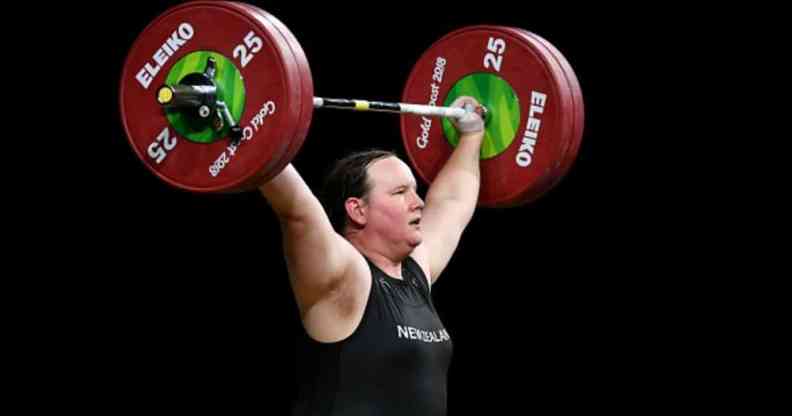Olympics committee praises Laurel Hubbard’s ‘courage and tenacity’ ahead of Tokyo debut

Laurel Hubbard weightlifting at the Commonwealth games. (Getty/ Dan Mullan)
Trans weightlifter Laurel Hubbard has been praised by an International Olympic Committee (IOC) director prior to her debut at the Games on Monday (2 August).
The IOC’s medical and science director, Dr Richard Budgett, paid tribute to the New Zealand athlete’s “courage and tenacity in actually competing and qualifying for the Games,” reported the Guardian.
Hubbard has faced intense criticism and outright transphobia over her qualifying for the Olympics. However, Budgett said that while he believes trans inclusion is “large, difficult and complex”, Hubbard qualified fairly and squarely.
“There are no IOC rules or regulations around transgender participation,” he said. “That depends on each international federation. So Laurel Hubbard is a woman and is competing under the rules of her federation.”
He continued: “Everyone agrees that trans women are women.”
In response to critics who have accused Hubbard of having an unfair advantage, Budget said: “There are lots of aspects of physiology and anatomy, and the mental side, hat contribute to an elite performance.
“It’s very difficult to say, ‘Yes, she has an advantage because she went through male puberty,’ when there’s so many other factors to take into account.”
He stressed that “the inclusion of everyone – whether they’re male or female” is also important.
According to the current IOC guidelines, last updated in 2015, trans women can compete in the women’s category if they keep their total testosterone level below 10 nanomoles per litre. That level is expected to be halved in a new framework, however, this has not yet been published because there is a lack of consensus.
World Athletics, which governs athletics, has come under fire for its own policy on testosterone levels, which has forced cis women who have naturally high testosterone, such as Caster Semenya, out of the Olympics.
These arbitrary rules on testosterone levels have been widely criticised, with many pointing out that hormone levels vary among all women, including cis women, while intersex campaigners argue that there is no scientific basis that female athletes born with variations of sex characteristics have any advantage over other female athletes.
Laurel Hubbard to compete in Olympics despite being targeted with hate
Laurel Hubbard’s journey to Tokyo hasn’t been easy, having received a lot of ire and hatred for competing in the women’s category in the past four years.
She made her first international debut in 2017 at the Australian International and Australian Open in Melbourne, and won, which led to the Australian Weightlifting Federation’s chief executive, Michael Keelan, calling her win “unfair.”
The press, anti-trans campaigners, and her opponents and peers have all chimed in on the ‘debate’ about whether or not it is ‘fair’ for trans women to compete.
In recent weeks, Hubbard has also been deadnamed and misgendered by the press and Olympic commentators, which is deeply offensive.
However, many in sport and in the LGBT+ community have rallied behind Hubbard, praising her inclusion as a step forward for trans rights.
Even her Team GB opponent, Emily Campbell, has welcomed her inclusion, saying the increased attention given to the sport can only be a good thing and echoing Budgett’s point that Hubbard qualified fairly.

